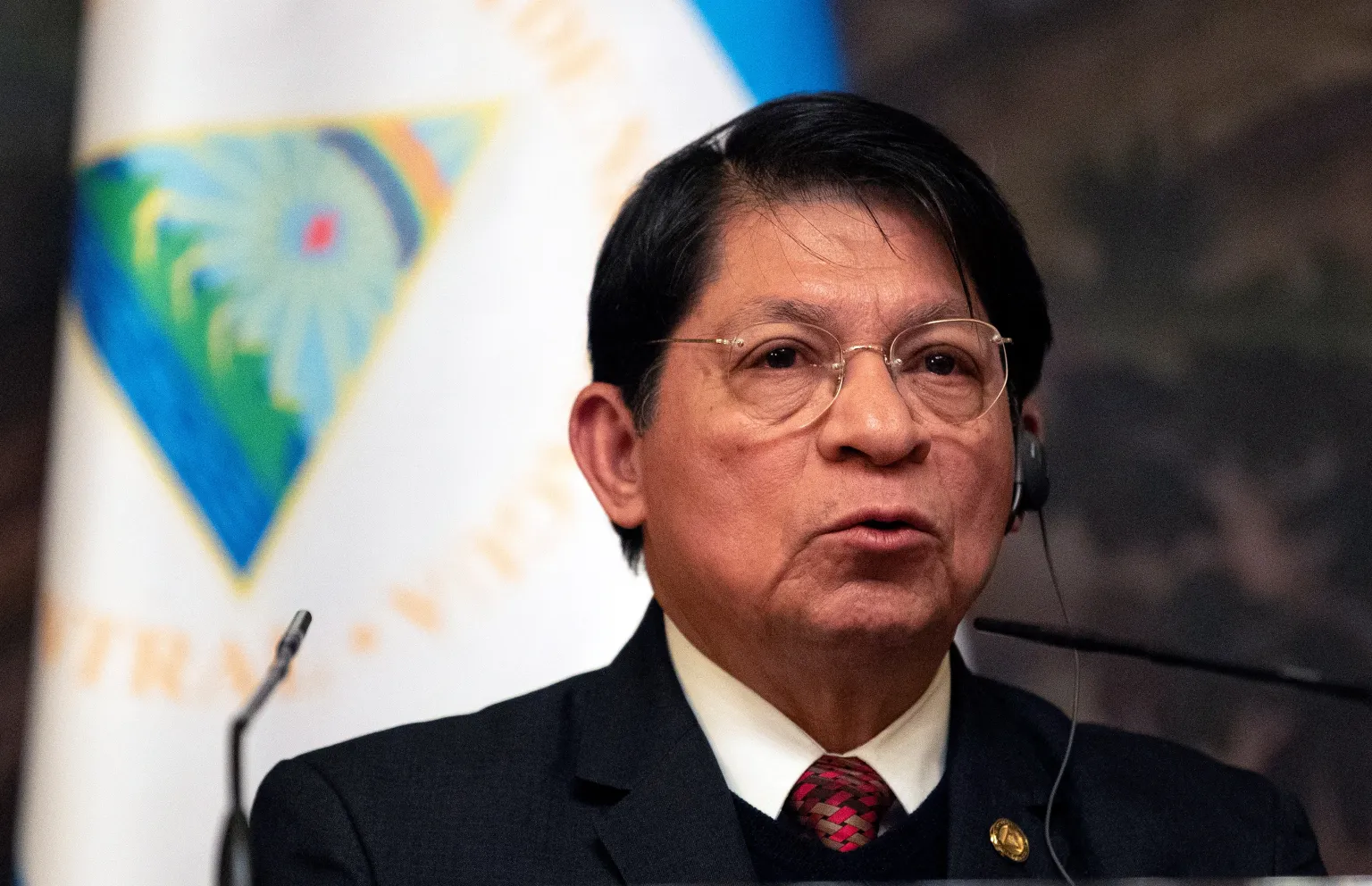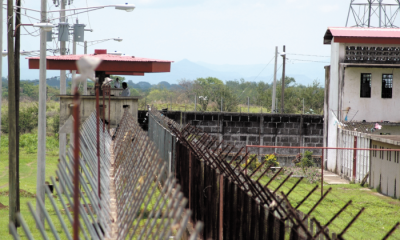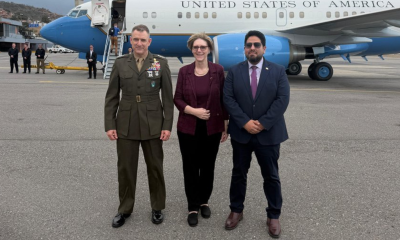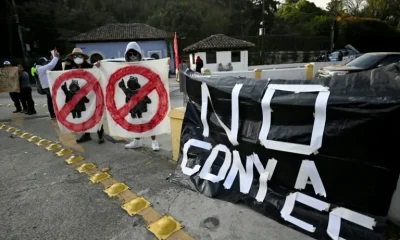Central America
Nicaragua threatens Costa Rica, Guatemala, Panama and R. Dominican Republic for impasse in the SICA

Nicaragua threatened Costa Rica, Guatemala, Panama and the Dominican Republic with taking “some measures” against them for opposing the election of former Nicaraguan Chancellor Denis Moncada as the new secretary general of the Central American Integration System (SICA), according to an official statement released this Friday.
“We have received your disrespectful and taxing Joint Note of today, November 28, 2024, which highlights its continuous, illegal and inappropriate blockade of Nicaragua, according to all the Treaties and Regulations governing the Central American Integration System,” said Nicaraguan Foreign Minister Valdrack Jaentschke, in a note addressed to his colleagues from Costa Rica, Guatemala, Panama and the Dominican Republic, and to all SICA Governments.
“In the face of this unusual insubordination of Governments and Foreign Ministrys that do not respond to the Law that governs us according to the Jurisprudence of our System, Nicaragua is considering some measures that we will communicate in a timely manner, on the contempt in which the countries subscribing to the Note have shamefully fallen, which also deny, absolutely and insanely, the power of our country to designate our own candidates,” he continued.
According to Jaentschke, former Chancellor and retired general Denis Moncada “has had and has the recognition of Governments, peoples and countries of the World, recognition and respect that cannot be ignored and / or denied by those who subscribe to this absurd communication.”
They invite you to reconsider
“We call for reconsideration of what we consider to contravene all the Presidential Agreements that have governed and govern the SICA, including the national sovereignty of our countries,” urged the Nicaraguan Foreign Minister.
Referring to the note from Costa Rica, Guatemala, Panama and the Dominican Republic, Jaentschke indicated that it “exhibits a denialist, exclusionary and discriminatory position, which is unacceptable from all points of view and that we are forced to denounce.”
Three weeks ago, the Government chaired by Daniel Ortega proposed a new tern of candidates as the new general secretary of the SICA, headed by former Chancellor Moncada, and also integrated by the Sandinista deputy Arling Patricia Alonso Gómez, and the Minister of the Family, Johana Flores, after two previous ternas presented did not reach consensus.
The previous terna was composed of Deputy Alonso; the Minister of the Interior, María Amelia Coronel Kinloch, and the presidential advisor for health issues and former Minister of Health, Sonia Castro, all sanctioned by the United States and in Castro’s case also by Canada, the European Union, the United Kingdom and Switzerland, for violation of human rights.
The first terna, presented on November 16, 2023, was headed by Jaentschke himself and included Violeta Irías Nelson, from the Attorney General’s Office for the Defense of Human Rights, and the official deputy Irís Marina Montenegro Blandón.
One year without the General Secretary of the SICA
Nicaragua, which holds the temporary presidency of that body, had convened an extraordinary meeting of the Council of Ministers of Foreign Affairs of the SICA for last November 15 “in order to advance in this process”, present the new terna and interview the candidates proposed by Managua, which was not held due to lack of consensus.
The General Secretariat of the SICA has been vacant since in mid-November 2023 the Nicaraguan lawyer Werner Vargas resigned from the position for the period 2022-2026, for which he was appointed as a proposal for Nicaragua.
Nicaragua has also denounced and rejected the “usurpation” of the General Secretariat of the SICA by an “Executive Directorate” of that body, which according to Managua has asked the governments of the region “to analyze a proposal for a work agenda and a draft budget of a General Secretariat that does not exist because it is unbrainering.”
The SICA, created in Tegucigalpa in 1991, is integrated by Belize, Costa Rica, El Salvador, Guatemala, Honduras, Nicaragua, Panama and the Dominican Republic as full members, while Mexico, the United States and other countries have the category of regional observers.
Central America
Washington Imposes Visa Ban on La Modelo Director Amid Crackdown in Nicaragua

The United States government announced Wednesday that it has imposed visa restrictions on Roberto Clemente Guevara Gómez, director of Nicaragua’s largest prison, La Modelo, for his involvement in actions that violate human rights.
In a statement, U.S. Secretary of State Marco Rubio said the measure is intended to promote accountability for abuses committed under what he described as the “Murillo-Ortega dictatorship” against political prisoners.
Rubio specified that Guevara Gómez was designated for participating in “a gross violation of the human rights of a political prisoner.” The sanction was issued under the 2024 Department of State, Foreign Operations, and Related Programs Appropriations Act, which bars the sanctioned individual — and potentially immediate family members — from entering the United States.
“United States demands the immediate and unconditional release of all political prisoners unjustly detained in Nicaragua,” the statement added.
Ongoing tensions between Washington and Managua
Washington rejected Nicaragua’s November 2021 elections, in which President Daniel Ortega and his wife, now co-president Rosario Murillo, were reelected while seven potential challengers were in prison.
Relations between the two countries remain tense amid expanding U.S. sanctions and increasing diplomatic pressure on the Nicaraguan government.
On January 10, marking Ortega’s 19 years in power, Nicaragua released “dozens of detainees,” including political prisoners. The move came one day after the U.S. Embassy in Managua stated that “more than 60 people” remain “unjustly detained or disappeared” in the Central American nation.
U.S. officials have continued to push for the “unconditional release” of political prisoners rather than selective or temporary releases.
Ortega, 80, governs alongside Murillo with consolidated authority, having strengthened executive power through constitutional reforms and security measures, while the opposition has been weakened by imprisonment, exile, and the revocation of citizenship and property rights.
Central America
Guatemala’s Attorney General Consuelo Porras Loses Bid for Constitutional Court Seat

Guatemala’s attorney general, Consuelo Porras, who has been sanctioned by the United States over corruption allegations, lost a key vote on Monday in which a public university selected two of the 10 magistrates for the country’s highest constitutional court. However, she could still seek a seat through another nominating body.
The election of five full magistrates and five alternates to the Corte de Constitucionalidad (CC) is taking place gradually over more than two months and is considered crucial in the ongoing struggle for control of Guatemala’s judiciary, which critics say has long been influenced by a political and economic elite accused of corruption.
According to results announced at a press conference, the governing council of the Universidad de San Carlos de Guatemala (USAC) rejected Porras, who had applied as either a full or alternate magistrate, and instead chose two candidates aligned with the university rector. The vote was held at a hotel in Antigua, about 35 kilometers from the capital.
Despite the setback, Porras — whose term as attorney general ends on May 16 — could still be nominated to the Constitutional Court by the Corte Suprema de Justicia, which appoints two magistrates. The remaining six are selected by the president, the bar association and Congress.
“It’s always a possibility,” the 72-year-old lawyer said days earlier when asked by reporters whether she would seek nomination through another institution if she lost the USAC vote.
Porras has been sanctioned by Washington and the European Union for allegedly attempting two years ago to block the inauguration of President Bernardo Arévalo and for pursuing legal actions against anti-corruption prosecutors, judges, journalists and social leaders since taking office in 2018.
The USAC vote was controversial because most members of the university’s governing council are serving beyond the expiration of their terms. Students, academics and social activists staged protests against Porras’ candidacy.
Central America
Teens visit ETESAL substation to learn about responsible energy use

Within the framework of World Energy Day, teenagers from the institutional care center Ciudad Niñez y Adolescencia (CNA), run by the Consejo Nacional de la Primera Infancia, Niñez y Adolescencia (Conapina), took part in an educational visit to a substation operated by Empresa Transmisora de El Salvador (ETESAL) in Santa Ana.
The aim of the activity was to give participants first-hand knowledge of how the country’s electricity transmission system works and to highlight the importance of responsible energy use.
During the tour, the group learned about the process that delivers electricity to homes, businesses, and industries. They were also introduced to specialized technical equipment and the safety measures required to ensure an efficient and reliable service.
Before the guided visit, the teenagers attended two informative talks and an environmental awareness session focused on the relevance of responsible energy consumption and its impact on the environment.
According to Nelson Menjívar, head of Conapina’s programs unit, the initiative serves a dual purpose. “It has two objectives: a recreational component and an educational one, so that adolescents can learn about the work carried out by ETESAL and how some of the resources they use at home are generated. This is in keeping with the guarantees established under the Crecer Juntos law; we ensure those rights for children,” he said.
Menjívar stressed that these activities help young people better understand how essential services function in their daily lives while promoting efficient consumption habits and a culture of environmental respect and care.
The event is part of the principle of shared responsibility set out in the Crecer Juntos law, promoted by the administration of Nayib Bukele, which states that families, society, private companies, and the State must work together to safeguard the comprehensive well-being of children and adolescents.
-

 Central America3 days ago
Central America3 days agoWashington Imposes Visa Ban on La Modelo Director Amid Crackdown in Nicaragua
-

 International4 days ago
International4 days agoFather Faces Murder Charges in Georgia School Shooting Case
-

 International2 days ago
International2 days agoTop U.S. Military Commander Meets Interim Venezuelan Leaders After Maduro’s Capture
-

 International3 days ago
International3 days agoBayly Says Trump ‘Gets Along Better With Dictators’ and Criticizes U.S.–Venezuela Policy
-

 International3 days ago
International3 days agoRubio Engages in Quiet Discussions With Castro Family as U.S. Pressures Havana
-

 International3 days ago
International3 days agoMaduro and Cilia Flores Receive Consular Visit in U.S. Jail Ahead of March 26 Hearing
-

 International13 hours ago
International13 hours agoThree Injured in Mail Package Explosion at Buenos Aires Gendarmerie Academy
-

 International4 days ago
International4 days agoSpanish Government Targets ‘Big Tech Impunity’ in AI Image Scandal
-

 International13 hours ago
International13 hours agoU.S. Targets Members of Outgoing Boric Administration With Visa Revocations
-

 Sin categoría2 days ago
Sin categoría2 days agoFormer South Korean President Yoon Suk-yeol Sentenced to Life for Insurrection
-

 Central America4 days ago
Central America4 days agoGuatemala’s Attorney General Consuelo Porras Loses Bid for Constitutional Court Seat


























